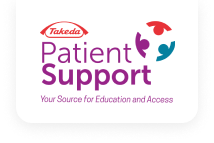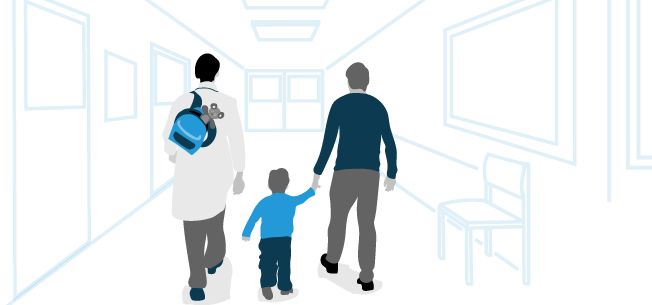Tailored Support
—for those with Hunter syndrome and their caregivers
After you and your physician choose a treatment path, Takeda Patient Support is here for you with a range of personalized services for your treatment journey—even when you need to travel away from home.
We know that living with Hunter syndrome looks different for everyone. As we get to know you, understand who you are, and learn what’s important to you, we can help provide the support you need when it comes to your treatment.
Takeda Patient Support is a product support program for people who have been prescribed ELAPRASE (idursulfase).
Our support specialists are here to address your questions and concerns, and help get you the answers, resources, and tools you need. Some of the ways we can help include:
- Copay assistance for those who are eligible,* as well as assistance with navigating complex reimbursement and insurance issues
- Coordination between your specialty pharmacy and your site of care, even if you are traveling out of town or relocating
- Helping you find information, education, and community resources about Hunter syndrome
- Assistance during life transitions like relocation, moving to college, or changing jobs

Want to connect?
Our support specialists are never more than a tap or a call away—1-866-888-0660, Monday through Friday, 8:30 am to 8:00 pm ET.
If English is not your patient’s preferred language, a support specialist can also communicate over the phone in a variety of languages—including Spanish—using a translation service.
Not enrolled in Takeda Patient Support? Here’s what to do:
- Work with your healthcare provider to complete the Start Form for your prescribed Hunter syndrome treatment
- Sign the Patient Authorization section of the Start Form
Takeda Patient Support will confirm your eligibility. Your dedicated support specialist will call you.
If you wish to sign up for Takeda Patient Support services, you and your doctor may sign a Takeda Patient Support Start Form. You don’t have to sign the Start Form to receive ELAPRASE therapy, but you will need to do so if you would like to receive Takeda Patient Support services. After you and your doctor sign the form, your doctor will send it to us and we’ll handle the rest. A read-only Spanish version of the Start Form is available for reference, to help guide Spanish speakers through the completion of the English form.
RISK OF SERIOUS ALLERGIC REACTIONS
Some patients have experienced serious allergic reactions (including life-threatening anaphylactic reactions) during and up to 24 hours after treatment, regardless of how long they were taking ELAPRASE. Anaphylactic reactions are immediate and include breathing problems, low oxygen levels, low blood pressure, hives and/or swelling of the throat or tongue. If a patient (you or your child) has experienced an anaphylactic reaction, the patient may require an extended period of observation by the patient’s healthcare team. If you or your child has breathing problems, a fever, or a respiratory illness, you or your child may be at risk of life-threatening worsening of those conditions due to allergic reactions from ELAPRASE. Your healthcare team should be advised of those conditions before treatment with ELAPRASE because the information may affect the timing of ELAPRASE treatment.



